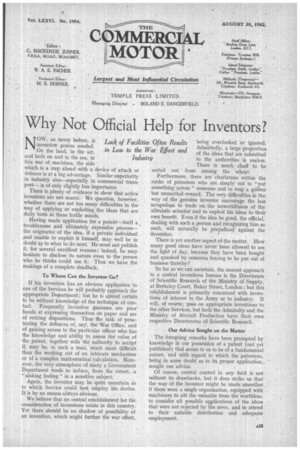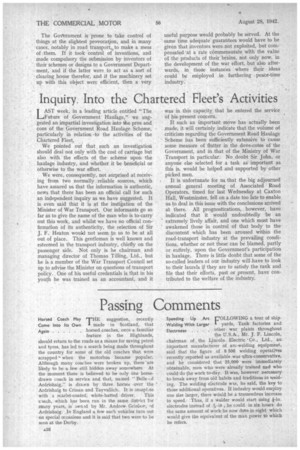Why Not Official Help for Inventors?
Page 17

Page 18

If you've noticed an error in this article please click here to report it so we can fix it.
NOW, as never before, is inventive genius needed. On the land, in the air, and both on and in the sea, in this war of machines, the side which is a step ahead with a device of attack or defence is at a big advantage. Similar superiority in industry also—especially in commercial transport— is of only slightly less importance. There is plenty of evidence to show that active inventors are not scarce. We question, however, whether there are not too many difficulties in the way of applying or exploiting the ideas that are daily born in these fertile minds.
Having made application for a patent—itself a , troublesome and ultimately expensive process— the originator of the idea, if a private individual and unable to exploit it himself, may well be in doubt as to what to do next. He must not publish it, for several excellent reasons; indeed, he may hesitate to disclose its nature even to the person. who he thinks could use it. Thus we have the makings of a complete deadlock.
To Whom Can the Inventor Go?
If his invention has an obvious application to one of the Services he will probably approach the appropriate Department ; but he is almost certain to be without knowledge of the technique of contact. Frequently inventive geniuses are poor hands at expressing themselves on paper and are of retiring dispositions. Thus the task of penetrating the defences of, say, the War Office, and of gaining access to the particular officer who has the knowledge and ability to assess the value of the patent, together with the authority to accept it, may be, to such a man, much more difficult than the working out of an intricate mechanism or of a complex mathematical calculation. Moreover, the very atmosphere of many a Government Department tends to induce, from the outset, a "sinking feeling" in a sensitive subject.
Again, the inventor may be quite uncertain as to which Service could best ernpIoy his device. It is by no means allays obvious.
We believe that no central establishment for the consideration of inventions exists in this country. Yet there should be no shadow of possibility of an invention, :which might further the war effort, being overlooked or ignored. Admittedly, a large proportion of the ideas that are submitted to the authorities is useless. There is much chaff to be sorted out ' from among the wheat.
Furthermore, there are charlatans within the ranks of patentees who are simply out to "put something across" someone and to reap a golden but unmerited reward. The very difficulties in the way of the ,genuine inventor encourage the less scrupulous to trade on the unworldliness of the altruistic scientist and to exploit his ideas to their own benefit. Even if the idea be good, the official, dealing with such a person and recognizing him as such, will naturally be prejudiced' against the invention.
There is yet another aspect of the matter. How many goad ideas have never been allowed to see the light of day, because they have been bought and quashed by concerns fearing to be put out of business thereby?
So far as we can ascertain, the nearest approach to a central inventions bureau is the Directorate • of Scientific Research of the Ministry of Supply, at Berkeley Court, Baker Street, London ; but this establishment is primarily concerned with inventions of interest to the Army or to industry. It will, of course, pass on appropriate inventions to the other Services, but both the Admiralty and the Ministry of Aircraft Production have their own respective Directorates of Scientific Research.
Our Advice Sought on the Matter The foregoing remarks have been prompted by knowledge in o'ur possession of a patent (not yet published) that seems to us to be of a fundamental nature, and with regard to which the patentees, being in some doubt as to its proper application, sought our advice.
Of course, central control in any field is not without its drawbacks, but it does strike us that the way of the inventor might be made smoother if there were a single organization, equipped with machinery to sift the valuable from the worthless, to consider all possible applications of the ideas that were not rejected by the sieve, and to attend to their suitable distribution and adequate employment. The GoVernment is prone to fake control of things at the slightest provocation, and in many cases, notably in road transport,, to make a mess ' of them. If it took control of inventions, and made compulsory the submission by inventors of their schemes or designs to a Government Department, and if the latter were to act as a sort of clearing house therefor, and if the machinery set up with this object were efficient, then a very useful purpose would probably be served. At the same time adequate guarantees would have to be given that inventors were not exploited, but compensated at a rate commensurate with the value of the products of their brains, not only now, in the development of the war effort, but also afterwards, in those instances where their ideas could be eniployed in furthering peace-time industry.




















































